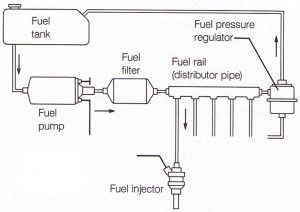 I’d like to give our friends in Denver a quick overview of the fuel system. It starts with the fuel pump. The fuel pump is located inside the tank and pumps the fuel out to the engine. Somewhere along the way is a fuel filter, it has the job of filtering out dirt before it gets to the engine.
I’d like to give our friends in Denver a quick overview of the fuel system. It starts with the fuel pump. The fuel pump is located inside the tank and pumps the fuel out to the engine. Somewhere along the way is a fuel filter, it has the job of filtering out dirt before it gets to the engine.
Our focus is to discuss how to make the various components of your fuel system work well and last as long as possible.
Now the best thing you can do for your fuel pump is to use good quality fuel. Top tier gas typically has fewer contaminants and more detergents to keep things clean. Using good gas, or adding a fuel system cleaner to your tank, can prolong the life of your fuel pump. Because the fuel pump lives inside your tank, it’s pretty expensive to replace, so helping it last as long as possible is a worthwhile goal.
The fuel filter catches dirt and contaminants. When it’s clogged, your engine may not be able to get enough fuel and could start to sputter. Many fuel filters have a bypass valve that allows unfiltered fuel past when the filter’s clogged. This prevents your engine from dying while you’re driving, but it can’t protect your engine from dirty fuel.
Check your owner’s manual or talk with your service adviser at Express Car Care about when you should replace your fuel filter. Fuel will cause gum and varnish to build up in the fuel intake system. A professional fuel system cleaning will remove the gunk to keep fuel flowing freely and help prevent contamination from reaching your fuel injectors and your engine.
Fuel injectors squirt fuel into the engine and the fuel must be delivered in a precise amount, at a precise time, under exact pressure, in an exact pattern. Pressure can range from 45 pounds per square inch to 45,000 pounds per square inch depending on the engine. As you may guess, fuel injectors cost a lot to replace. Allowing them to get gummed up will not only hurt your engine performance and fuel economy, it will also cause the injectors to wear out much more quickly than expected.
A professional fuel system cleaning will keep injectors clean and working correctly. It’ll also clean deposits from the inside of the combustion chamber and off the intake valves, giving you optimum performance and mileage.
Check with your service adviser and see when he recommends you have a fuel system cleaning.
